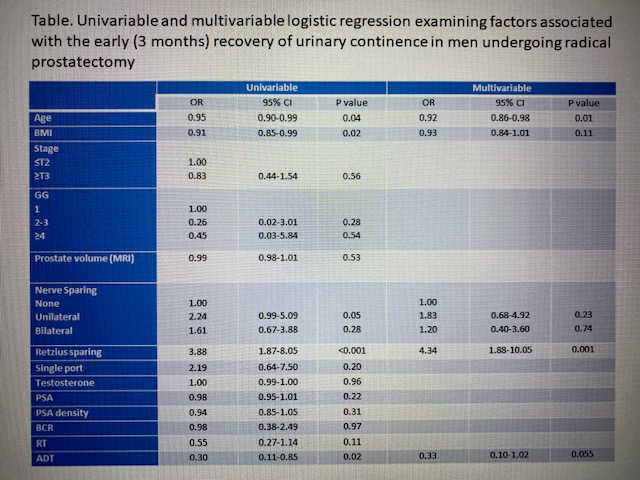Association between age at the time of surgery and recovery of urinary continence in men undergoing radical prostatectomy
Ghazal Khajir, MD, Jack Gagne, MD, Kamyar Ghabili, MD, Olamide Olawoyin, BS, Nathan Paulson, MD, Preston Sprenkle, MD.
Yale school of medicine, New Haven, CT, USA.
Background:Urinary incontinence is one of the most concerning complications of radical prostatectomy (RP). Therefore, studies have focused on predicting different preoperative factors such as age at the time of surgery. Older patients seem to be at relatively higher risk of urinary incontinence after RP. However, there is still a debate over the specific cutoff for age associated with increased postoperative urinary incontinence rate. We sought to assess the association between different pre- and intraoperative factors, including age at the time of surgery and recovery of urinary continence (UC) in men undergoing RP.
Methods:Between April 2013 and September 2020, men undergoing robotic-assisted laparoscopic prostatectomy (RALP) by a single urologist for clinically localized or locally advanced prostate cancer in our institution were studied. Age at the time of surgery, body mass index (BMI), type of surgical approach (nerve-sparing, Retzius-sparing), MRI-based prostate volume, preoperative PSA, serum testosterone level, and pathological T stage as well as Gleason grade group were documented. Achievement of UC was defined as wearing no pads or an occasional security pad by patient-reported daily pad usage within 3 (early) and 12 months (late) after RALP.
Results:One hundred seventy-eight patients underwent RALP. The median age of patients was 63 years old (interquartile range 58-67). Postoperatively, 65 (36.5%) and 133 (74.7%) men achieved early (3 months) and late (12 months) recovery of UC, respectively. Multivariate logistic regression revealed that younger age (OR 1.16; 95%CI 1.05-1.29; p=0.006) with lower BMI (OR 1.23; 95%CI 1.03-1.47; p=0.02) who underwent Retzius-sparing surgery (OR 5.12; 95%CI 1.37-19.05; p=0.01) showed early recovery of UC. Among different age categories, age of 60 years or younger was significantly associated with the achievement of early UC (OR 4.54; 95%CI 1.35-14.28; p=0.01).
Conclusion:Early recovery of UC is primarily associated with patient-driven characteristics such as age and BMI. Age ≤60 years was associated with the achievement of early UC. 
Back to 2021 Abstracts
